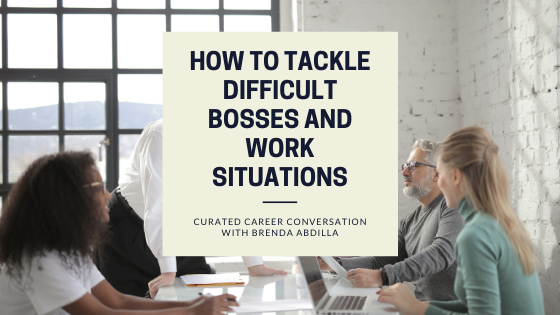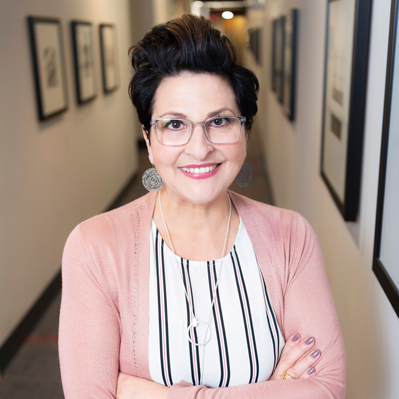How to Tackle Bad Bosses and Difficult Work Situations

Early in my career, I moved to a smaller city so that my husband could pursue graduate school. It was the height of the last recession, and virtually everyone was on a hiring freeze. Thankfully, I landed a job, but it was far from ideal. When I left my first interview, I knew that it was going to be a challenging situation, but I felt like I didn’t have a choice. Every day in that job was a personal test. I’ll spare you the gory details, but I will say it was a test to my self-worth, my marriage, and even my career. I dreamed of quitting and working at bakery. I was in Crazytown.
My experience was not unique. A 2018 Monster poll shared that (76%) of U.S. respondents currently have or recently had a toxic boss.
I had the opportunity to interview Brenda Abdilla, author of Outsmarting Crazytown: A Business Novel About How Derailed Professionals Can Get Back On Track (2020, Indie Books International). She based the novel on the first-hand experience with seasoned executives who got derailed. Abdilla is the founder of Management Momentum LLC and a PCC level Professional Certified Coach, a distinction shared by less than 35% of all coaches worldwide. Since founding Management Momentum in 2004, Abdilla has developed a comprehensive portfolio of options for clients who want to navigate career changes and job promotions; increase productivity; improve leadership skills, and remove obstacles in the way of moving forward. Through coaching, workshops, programs, and assessments, she helps clients reach their desired outcomes sooner rather than later.
Sarah: Let me say; I love the title of your new book, Outsmarting Crazytown: A Business Novel About How Derailed Professionals Can Get Back On Track (2020, Indie Books International). You define “Crazytown” in your book as “Living in a state of insanity or being around the crazy/insane of the universe.” You give a lot of great examples of what “Crazytown” feels like, but one that resonated with me is:
“Crazytown is working for a newly promoted boss who listens to your phone calls through the thin walls separating your offices, insists on reviewing and editing every communication you send out to the team, and scrutinizes every dollar you spend from your department budget.”
I have been there! I had a boss that would not let me make the decisions I was hired to make, and it ultimately led to me leaving the company. Do you have personal experience working in “Crazytown”? What led to you writing this book?

Brenda Abdilla: Yes, your experience is not uncommon. Being denied “a seat at the table” is a chief complaint in today’s world, especially if it is a change from how things were for you. I had a client who was in a very senior role and was the key decision maker on major projects for his organization. Then, there were some changes at the top and he was essentially demoted—not in any official way, but because the new Chief saw the organization structure differently and my client was no longer viewed as a decision maker. Of course, he still had accountability, but no power. It was incredibly frustrating. He stuck it out for two more years and then left the organization. That was his personal Crazytown.
For me, Crazytown was one of my roles in my early twenties. I had a boss who stole credit for my work and ideas, and sexually harassed every woman on the director team, including me. But the real reason I wrote the book was to make sense of what my clients have confided in me over the years and help others deal with similar situations in a productive way. Every single example in the book actually happened; of course, I have changed the circumstances in the novel to make the people unrecognizable.
Toxic Corporate Culture
Sarah: How do you think “Crazytown” happens? Simply put– can historically good companies with great cultures take a turn?
Brenda Abdilla: Sure, occasionally Crazytown infiltrates the entire company, but mostly it is an individual hell we are talking about. If you are experiencing it, it can feel like the whole company is against you, but often it is what you are experiencing individually that makes it Crazytown. In my work as a leadership/executive coach when I work for a company internally, I sometimes hear dramatically different perspectives about the same boss. For example, I once heard the following two descriptions of the very same division chief:
“She is a maniacal, evil, manipulative, political animal. I don’t trust her as far as I can throw her.”
“She has been a key mentor to me. I completely trust her with the trajectory of my career.”
Ultimately, if you are extremely burned out or stressed out, something needs to be done even if no one else is experiencing it. And unfortunately, “sucking it up” is not going to work. One of the most heartbreaking things I hear from my clients is when they say, “I stand outside the building every day and I have to force myself to go in.” Regardless of whether you are the only one experiencing it or not, it is your reality and it needs to be dealt with. And it’s complicated. Not everyone can just leave and find another job. I believe there is a process for figuring these things out, and that process is why I wrote the book.
How can we do a better job in the interview process of identifying bad bosses?
Sarah: How can job seekers do a better job in the interview process of identifying bad cultures and toxic bosses? Specifically, how do you suggest job seekers get intel?
Brenda Abdilla:Figuring out the company culture, and specifically whether it is a fit for YOU, is both critical and very difficult to do. The first overarching element of getting a real picture of the company is to make sure you are presenting the real, authentic version of yourself in all of the interviews. It is difficult to do this if you feel a sense of desperation about finding a new role or getting hired-on. Desperation has to be contained or it will grossly impact your decision-making process in the job hunt.
The upside is that presenting your authentic self at the interview allows you to use it as a tool to get some sense of how the organization will respond to your presence once you join. Culture is a very individual experience. Let’s say, for example, that you are a highly experienced CFO and that your core belief is that each business unit is held accountable to their bottom line financials in a timely manner, no matter how much revenue they contribute to the company coffers. But then in the interview process the CEO says something like, “Well, we are very flexible and forgiving with our higher producing business units, because they are too busy to be bothered with doing the financials when I want them focused on sales.” While this may be a perfectly legitimate perspective, it flies in the face of your core beliefs about the work. This would be a good time for some frank—but respectful—discussions about this subject and about how open they are to change. Otherwise, you are heading into a potential Crazytown situation.
Another way to get intel on culture is to observe the underlying behaviors during the interview process. Does the hiring manager say things that are in direct conflict with what HR told you? How does the tone of the emails you are getting strike you? Are they direct and clear? Lengthy and unclear? How would you describe the organization so far? Is it highly structured? Creative? Formal? Edgy? And how does it suit you? One of my clients worked for a very hip, progressive organization that did not track people’s time. But she was an over-achiever and it drove her crazy that people came in “late” and left “early.” She would send me pictures of the empty office. That culture was not a fit for her.
Sarah: What are your favorite revealing questions to ask during the interview?
Brenda Abdilla: The author of The First 90 Days has some stellar questions in his book which I recommend as interview prep to anyone who is applying for high-level roles.
And some of my own favorite questions are:
-Can you tell me about someone who did not succeed in this role? Why didn’t they? -What personality traits and attitudes do you think work best with this role? -What is the past track record for this role? -How has the company culture evolved over time? -What do you see as the key things that will impact the future of this department/company?
Leaving a Toxic Work Environment
Sarah: As a career coach, I often see job seekers who are so burned out after leaving a toxic work environment that they need a change. I’ve seen software engineers become craft brewers and teachers become yoga instructors. What is your advice for job seekers wanting to change careers?
Brenda Abdilla:My take on the “major lane change” in a career is to make sure it is not what I call a stress fantasy. A stress fantasy is something that sounds great, and may even be aligned with a personal passion, but it may not have the chops to support you and your family over time, or it may take years for you to get up to speed on the new industry. This is a process I explore with nearly every client at some point. Our culture tells us that if we are unhappy at work, we should change to something that makes us happy. It’s not quite that simple.
Before making any kind of change, we have to deal with the burnout. Burnout is real. The World Health Organization now classifies burnout and workplace stress as a disease/occupational phenomenon. When I was a professional speaker in my 30s, I would deliver all-day workshops that lasted 8-9 hours, working with companies all over the world. I became extremely burned out, but I kept telling myself I was lucky and had a great life and should just suck it up. After a few years of denying I was burned out I started forgetting my own material! It was creepy. I finally went to a therapist and she told me I was burned-out. Luckily for me, I was able to pivot to a consulting business. I developed deeper relationships with fewer clients and had less travel. But what if I had opened a catering business (something I actually considered, since I am an amateur gourmet cook)? Catering sounded so good at the time. I love cooking but I know nothing about catering. Plus, I had a fairly high income as a speaker which my family depended upon. Could catering match that income right away? Doubtful. Also, the chances of the catering business not becoming what I had in mind and me becoming disillusioned with it were high. Sure, some people make a huge career change and succeed, but most do not. Often the best strategy is to pivot. Find something that uses your years of skill and experience in a new and different way or find an organization that suits your values and beliefs better. Or start a consulting company in your area of specialty (assuming you like selling yourself and your ideas). Your experience and leadership should be paying you back, so don’t be so quick to throw them away.
Know Yourself Before Launching a Job Search
Sarah: In your book, you talk about the value of identifying your blind spots before you enter into a job search. Why is it important to do a self evaluation or 360? (As an aside, I enjoyed your presentation on blindspots and would encourage job seekers to go through the exercise)
Brenda Abdilla:Nearly everyone I work with has something they imagine is holding them back from getting a promotion, getting hired or getting the recognition they deserve. And, unfortunately, nearly everyone is wrong about what that thing is. A common refrain I might hear from a client (let’s call him Neal) is, “Well, everybody has an MBA at the director level. It’s not official or anything, but it is clear to me that the home office only promotes those with an MBA—and I only have my bachelor’s degree!”
But the head of the department might see it differently. “Neal is great and very eager, but he’s a little weird. Every time he completes a project, he comes to me and asks about being promoted to the director level. It’s like clockwork. I have clearly explained that we do not promote people for doing what is expected. He needs to exceed our expectations, raise his hand for extra projects and stop being such a pain in the ass.”
Neal likely keeps gathering evidence in his mind about the need to get an MBA. His blind spot is not seeing what is really holding him back in the organization. Blind spots are most often connected to some communication habit. In Neal’s case, a confidence issue is causing him to constantly seek outside assurance of his value. If it continues, he may communicate himself right out of a job.
Asking for a 360 evaluation is great if you feel you are in a trusting and supportive culture. If not, conduct your own feedback process by asking former and current bosses and co-workers some good questions (and be sure to reassure them that you want and welcome candid feedback). A few examples might be:
-In your view, what are my best communication habits?
-Where could I improve my communication habits (written or verbal)?
Its not you, it’s me.
Sarah: What happens if you figure out that you are the problem? Is there a way to correct the course? How do you repair relationships?
Brenda Abdilla:Depending on the nature of the blind spot, sometimes an apology or a public statement (to your team or whoever) is in order. Reputation repair is something we will have to do at some point in our career. It is important to remember that it is really hard to change people’s perception of others, so keep your expectations low and don’t look for constant affirmation that everything is all better. Just be authentic, and over time you might be able to help people have a different view of you.
Sarah: If you could go back in time, what would you tell yourself five/ten years ago?
Brenda Abdilla:It was about 10 years ago that I decided to cut all consulting contracts and focus only on coaching. My coaching went from being about 30% of my business to 100%. It was not easy. I had to develop a whole new network—something I did not realize at the time. So, if I could go back in time, I would say don’t worry so much. It is going to be the best change (evolution) you have made in your life. Keep going!
Sarah: What’s the best career advice you’ve ever gotten? Did you take it? (I ask everyone this question)
Brenda Abdilla:The best advice I got was, “Don’t go bankrupt to help a nonprofit.” I have always been passionate about the safety of women and children around the globe—or lack thereof. The first time I was a member of a nonprofit board I wanted to devote 100% of my time to it. I resented having to work, even though I had a very successful business. I mention this because I know how passionate people, especially millennials, can be about fixing the world—and man, does the world need fixing! But if you want to come from a position of strength you have to take care of your career and your own success as well. It’s no good being a martyr for a cause. I have a much greater impact on women and children now than I would have if I had let my business fail and devoted myself only to that one aspect of the cause.
Learn more about Brenda Abdilla
Want to learn more about Brenda Abdilla:?
Visit her blog/vlog-The Coaching Minute: Powerful Insights for Professionals

